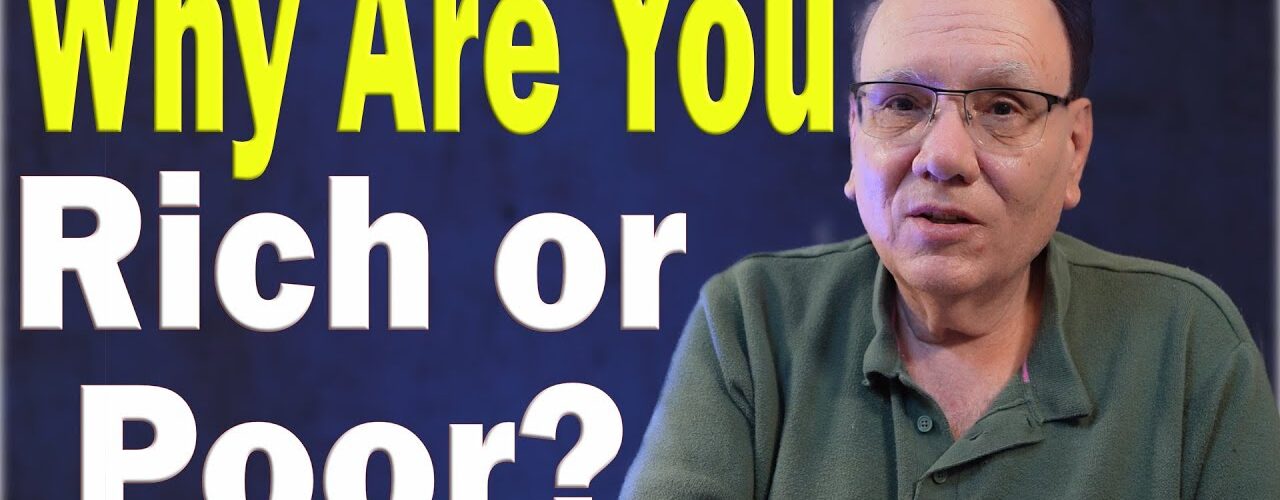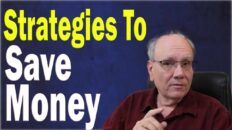Have you ever wondered what the difference between being rich and being poor is? Stay tuned to today’s video because that’s exactly what I’m gonna dive into and it’s a bit of an unplugged session today. No notes, just right off the top of my head. I think you’re gonna enjoy it.
I’m all about looking at life from the point of view of What can I do? What are the simple things that I can do that will help me become wealthy in life? Now, let’s start right off by saying wealth to me is just not a dollar sign. Wealth to me is being happy in life.
Wealth to me is being able to serve those around me. Wealth to me is doing what I enjoy doing and Wealth also means having some of the finer things in life. My wife likes to say that I’m a snob and sometimes I, you know, I hate to say it, but I am.
But I also try to be really down-to-earth all the time and that’s the reason for today’s particular video. What I came to realize was there is one thing that you can really decide upon and this is a personal decision for yourself. And every one of us is going to make a slightly different decision on this.
But we need to discover how do we actually live? Now what I mean is let’s look at the dollars and cents here. Do we live extravagantly spending every dollar plus a few more that we don’t have or do we be a little more frugal? And do we put away? Yeah, it comes down to literally do we live within our means? I didn’t think this was going to be an exciting topic. But the more I thought about it, the more I came to realize that this is really really important.
This is something that I failed to do for a very long time and I paid a very high price for it. And I don’t want to see you pay a price for this. So let’s just take a look at this and what does it mean to live within our means? First off, it’s pretty cut-and-dry.
Are you spending less than you earn? Full stop. Are you able to spend less than what you earn and also put some extra money away for tomorrow? Are you spending less than what you earn and have a little bit extra to become more educated so you can learn to earn more? These are all the things that are very important and these are philosophies that I have adopted in my life. And I’ve lived by for a very long time.
Now, I won’t lie to you. For a long time I lived beyond my means, not under my means, but beyond my means and I paid a very high price for that. I was always in debt.
I was always scrambling. I was always under a lot of stress and to be bluntly honest with you, it sucked. It was terrible.
It was very unpleasant. And it took a long time, almost 55 years for me to realize that this is not the way to live life. I need to live life, not wantonly and dancing through the fields, but being responsible with what’s been given to me as a resource.
But not only that, learning how to save and put away for a future self, you know, like in other videos I’ve said this particular term, don’t rob from your future self. I need to learn not to rob from my future self because what I can save today is not necessarily what I’ve saved, but what it becomes from my future self. That’s what’s really important here.
It really disturbs me. I was watching a video the other day and this really kind of struck home, this whole idea of living within your means. This fellow was on his fourth car lease. The guy was like, how can I just afford this? I think this is a great deal. How can I afford this? And I think I can put it together and it, like I said, it’s just such a great deal, I can’t pass it up.
You know something, if you can’t afford it, it’s not a great deal. I’m gonna be straight up with you. How much car debt are you carrying every month, whether it be in a loan or a lease? How much? I had to make a hard decision when it comes to vehicles.
My wife’s van died and we need two vehicles because she goes and she has worked as she does out of the house and so do I. So we both need vehicles where we live. I went to take her van in to get it repaired and I discovered it was beyond repair. It’s not that it was too expensive to repair.
It was literally beyond repair. The frame of the actual van had rotted from the inside out and we didn’t, I didn’t know this. Didn’t know until we tried to put it up on the lift and the lift went right through the body of the van.
We did a little more investigation and it just wasn’t worth fixing anymore. So I had to make the hard decision to scrap the van and find another vehicle for my wife. Now, I could have made a decision and I won’t lie to you.
I was tempted to go buy her a brand new SUV. Probably a good thing that Toyota couldn’t give us what we wanted right away and we had to wait for it because it gave me a few months to reflect on it and also to do a little more research. I was looking to spend over $55,000, $60,000 on a van.
Now that is going to be close to $1,000 a month in payments. I was going to put down a whole bunch of money. But still that’s a lot of money to put down or to pay for a vehicle.
Eventually what I decided upon was I did a little bit of constructive research and I looked at other options, options that I had not investigated before. Eventually we settled on a van that was made by Ford. Now construction-wise I don’t think is as good as a Toyota and I can say that because I have a Toyota already and I have a Ford and I find the Ford’s a little mmm in places, but you know something it satisfies the needs and my wife’s really really happy with it.
Hence, I only paid about $35,000 for it compared to almost $60,000. That was at least a $20,000 to $30,000 saving. Now what I can do is pay that van off rapidly and that’s what I’m trying to do.
I’m trying to start paying a little bit more on it and just pay that van off as quickly as possible. Now turn around and I have to commute quite a bit. I have to commute about 30 minutes down the road and another 30 minutes on the train and another 20 minutes walking to get to work every morning and that was grating on me and I seriously considered moving into town and I and but I sat down and realized that there’s a $50,000 expense.
Hey we’d walk away like banshees because the market here is really hot, we do really well, we get a lot of money for our place and we could probably get into something in town. But there is still that expense of selling the house and moving and it equates to close to $50,000 by the time the dust settles and I thought to myself $50,000 and if I can just put up with it, put up with the commute. I’m not gonna be doing it for another 20 years, maybe another three or four years.
I love the job I’m in. I don’t want to really leave it. So I like to keep it.
But the commute is really hammers at me, so I had to kind of come to course correction here and this is sometimes you’ll have to do. You’ll have to come to terms and think about something and think really is this the best option?
No, I thought of appeasing myself by going and purchasing a newer vehicle like buying something that’s an EV and I could put all kinds of justification behind it, but at the end of the day we’re back to that $60,000 figure and my wife said to me, well pick your poison.
Did we spend $50,000 buying a house in town? Or did we spend $50,000 on a vehicle? And I didn’t want to spend $50,000 on either one because again I came and I thought and I reasoned about it and I had to do two things.
First one was I had to get right or be okay with my commute. So I just let it go. It’s like, you know I’m gonna find a way to make that time a good time.
So I listen to audio books. I listen to some of my scriptures that I like to listen to things like that when I’m driving. So it the time does go pretty quickly.
I’ll be honest with you now that I’ve started doing that. So I had to become okay with the commute. I had to be okay.
Secondarily back to purchasing another vehicle. Buying another vehicle. I remember watching another video that said it’s really great.
You get a new vehicle and within a year or so you start to dislike the payments because the shininess of the vehicle has tarnished. It’s true. So I sat and I thought about and I thought, you know, again, I had all these excuses.
I had all these excuses of I have to fix the vehicle and I have all these repairs coming up. When I sat down and actually wrote down all the things that I think could happen, I would spend way less than $20,000. Let me ask you a question.
Even if the vehicle is only worth $10,000 or $15,000 and I’ve got to spend another $20,000 on it. It doesn’t make sense, does it? But if I go purchase a like vehicle, it’s going to be $15,000 or $20,000 and nothing’s been repaired. It kind of makes sense just to take care of what you got and keep it running and keep it repaired.
Keep it in good standing and don’t spend that $50,000. So that again brings me back to that whole question of living within my means. Could I afford to go buy a new car? Yeah, absolutely.
I could but it will hamper my saving efforts. I’ve already waited way too long to save for retirement and now I am saving my little face off. I did a few calculations and discovered, hey, if we just sit tight where we’re living.
I’ve put solar panels on the roof to help alleviate the cost of electricity. That’s never gonna go away. So with the solar panels we break even.
Once we have what’s all paid for, we break even. We don’t have to pay anything for electricity, which is great. It’s gonna save us close to $3,000 a year or more every year in electricity.
If we just stay put and I bank as much as possible, we will be okay. When I hit 65 in four years, I’ve saved enough that I could go part-time at that moment in time and just do some work here and there, pay the bills and let whatever I put away grow. Now the cool thing about that is anytime between 65 and 70, I can pull the pin and say, okay, I’m done and we’re in good shape.
The learning I’ve done I’m getting 11-12% on my returns right now. Now does performance today speak of performance tomorrow? No, absolutely not. I could be better, could be worse.
One thing I do know is if I bank on the S&P 500 at the very least, I’m gonna make at least 8%. And at 8%, if I saved at least $450,000, which I will, we should be okay. Either way, we should be okay.
And every year that I can delay taking anything from that account after 65, again, it’s gonna grow. It’s gonna, I think it takes another three or four years and it’s in the 600s. No matter how I look at it, it’s a good thing to be.
And the cool thing is I don’t have to be stressed about moving. I just keep things, I keep the wheels on the wagon and I stay and I continue living within my means. You know something? It’s nice paying cash for things.
It’s nice going and just enjoying life for what it is. I have more spending money now than I ever did, which is nice. Now, yeah, I go and I spend money every month.
I go take my wife to dinner or we go to the movies or we go to a show or we just enjoy life. And it’s fun. Tomorrow we’re gonna be going, the Calgary Stampede is in town and we’re gonna go to that tomorrow.
I know I have the funds and I don’t have to use a credit card or take what I don’t have and start living outside of my means because I’ve made a plan. I made a budget. Now one thing you want to look at too when it comes to living within your means is learn to live with not only with what you make but less 10% of what you make.
So in other words, if you’re bringing home $8,000 a month, gross, take away 800. You might say to me, Frank, that’s impossible. I can’t live on that.
Sure you can. Believe it or not, you can. Regardless of what you make, if you sit down and you really start looking, now there will be some fringe cases and I’ll be straight up with you.
There’s gonna be some people who are really struggling and I get that and this message is not for you. You need to get out of your struggles first. But most people and I’d say a strong majority with that less 10% and they start paying themselves first and that makes a big difference because now you’re not robbing from your future self.
So just think about that. That’s something to really, really, really think about. Eventually, you want to get yourself to a place where you’re putting away 20% of your gross wages.
Sounds impossible, but I’m doing it. I’m doing it right now, and I want to get to 30% of my gross wages. It’s been a lot of hard work, but I’ve done three big things in my life.
Well, the first one, it was one we’ve always been talking about, living within my means, but let’s say my list of three is I know what my expenses are and I make sure my expenses are covered. I make sure I earn enough that I can put away 20 to 30% and the third one is I have a plan and I have a budget for all of these things. Now a lot of people don’t like having a budget.
That’s why I say to you, if you don’t like having a budget, if you hate balancing your checkbook, watch what you spend. Know what has to be paid. There’s a lot of simple ways you can do it, but find a way to extract at least 10% and start paying yourself first.
If you are in your 30s to 40s, you’ve got a brilliant window. Time is your superpower here. Time will make you a multi-millionaire if you start shaving at least 10% out.
If you’re in your 40s to 50s, time is starting to be against you and if you’re in your late 50s and you’re in your 60s, time is unfortunately not really a superpower for you unless you can build a plan like I’ve done. I really didn’t start saving until I was 57, so shame on me. But I’ve saved really hard over the last three years.
I’ve saved over, well, I’ve just broke $150,000, which is brilliant. But I’m going to continue saving and continue saving hard and putting away and learning how to invest and make that money worth more. But not only that, I’m training myself on how to earn more all the time.
And I’m also looking for work that’s going to give me the most challenge. That way I stay interested in what I’m doing and I can really, really, really shine in them. Things to think about here.




